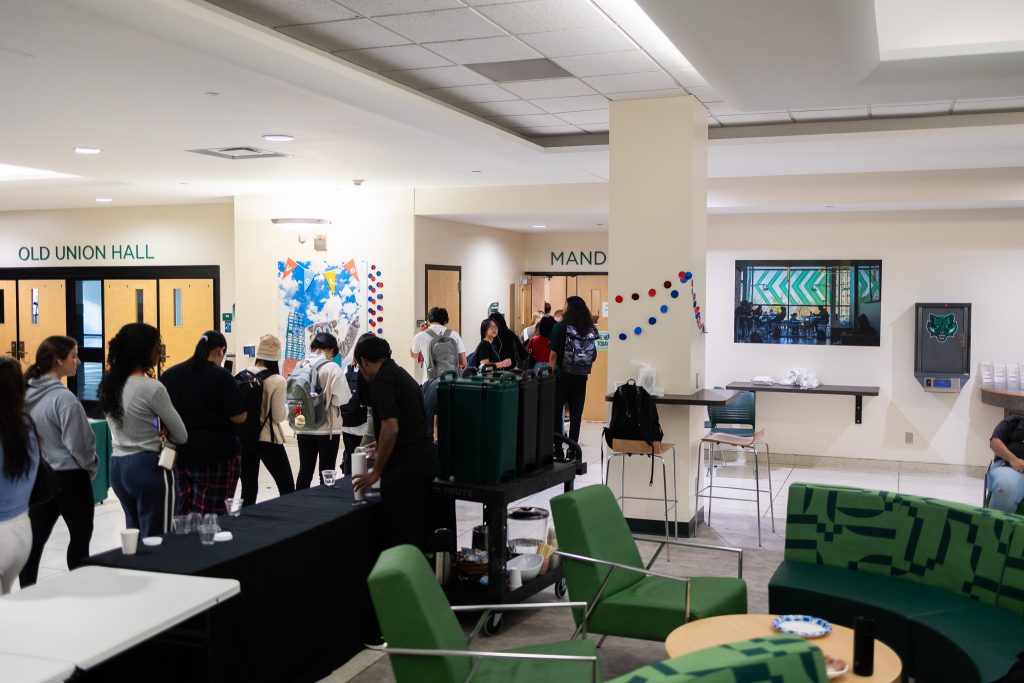Students living on campus made their political voices heard two weeks ago through early voting, filling out absentee and provisional ballots or by showing up in-person on Election Day. But who did the student body support this election cycle?
Binghamton University is divided into two town of Vestal election districts. District 11 includes students living in Hinman College, Mountainview Community and College-in-the-Woods, in addition to those in on-campus apartments at Susquehanna and Hillside. Newing College and Dickinson Community — with the exception of Old Rafuse and Old Digman — are grouped into District 12.
Vice President Kamala Harris won the overwhelming majority of votes from student with on-campus addresses, receiving 1,673 — 957 from District 11 and 716 from District 12. Former President Donald Trump, the winner of the 2024 presidential race, received 469 votes from on-campus students — 211 from District 11 and 258 from District 12.
More students voted on campus this year compared to 2020, when the COVID-19 pandemic was still raging. Harris received less raw support than Hillary Clinton, who won 2,110 votes on campus in the 2016 presidential election. Trump, by contrast, received 27 more votes in 2024 than he did during his 2016 run.
Harris won Broome County by only 380 votes out of 89,872 cast for a major-party candidate. Joe Biden won the county by 3,211 votes in 2020.
Alison Handy Twang ’11, MPA ’13, Ph.D. ’22, the director of the Center for Civic Engagement, described how updates to New York state voting law partly contributed to the change in the number of on-campus student voters.
“In 2016, New York did not have early voting and it was more difficult to vote by mail, resulting in more students voting on-campus on Election Day,” Twang wrote. “In 2024, on-campus students also had the option to vote early or more easily by mail.”
Student voting proved critical for Democrats in several down-ballot races. Josh Riley, an Endicott native who overcame incumbent Rep. Marc Molinaro, picked up 1,631 votes from students living on campus while Molinaro received 426. Riley won the 19th Congressional District, which includes Cornell University and Ithaca College, by a little more than 7,900 votes.
State Sen. Lea Webb ‘04 won 1,595 votes from those on campus and was comfortably reelected in the 52nd Senate District, defeating Republican challenger Mike Sigler. She praised student political participation while pledging to continue addressing the relevant issues.
“Students across my senate district showed an extraordinary amount of civic engagement over the course of this election,” Webb wrote to Pipe Dream. “They showed up to vote in great numbers because they know how much is at stake. Young people have concerns about being able to afford their education, get a good-paying job, and live a comfortable life, in addition to worrying about the climate crisis and everything going on in the world. I am committed to fighting to ensure that the students across my district, in all six colleges and universities, have the resources they need to thrive.”
A coordinated campaign — led by Gov. Kathy Hochul, U.S. Sen. Kirsten Gillibrand, House Democratic Leader Hakeem Jeffries ‘92 and the Democratic Congressional Campaign Committee — was formed to maximize support for Democratic candidates statewide. More than 30 field offices were opened, and six full-time youth organizing staffers were hired.
Republicans, in the 2022 midterm elections, flipped four congressional seats in New York. Two weeks ago, Democrats flipped back three of those districts, including Riley’s win against Molinaro.
Margalit Frank, a freshman majoring in philosophy, politics and law, worked on the Riley campaign this year. She shared how youth engagement was a critical part of his victory.
“Josh Riley ran for office for the first time in 2022 but narrowly lost to Marc Molinaro,” Frank wrote. “To address that gap in the 2024 election, Riley’s campaign poured a lot of resources into outreach on different college campuses in New York’s 19th district. At Binghamton University specifically, we spent a lot of our time dedicated to broad voter engagement efforts. This included tabling on the Spine and registering students to vote between classes, and a big voter registration fair on campus. Many of our efforts were nonpartisan, and more geared toward encouraging all students to vote, regardless of their political affiliation.”
Frank described how the campaign organized a literature drop to dormitories for Riley and Webb. Though the campaign was successful, Frank said youth engagement could be improved through increased student awareness of the importance of down-ballot races.
Exit polls indicated that Harris won voters aged 18-29 by 11 percentage points nationally — a noticeable decrease from Biden’s 24-point margin with that group in 2020. Young men voted for Trump over Harris, while young women voted for Harris by a sizable margin. Benji Federman, the Broome County Republican chair, said the party will continue reaching out to young voters — especially on nontraditional media platforms and through Young Republican Clubs across the state.
Abigail Connors, a campaign fellow and junior majoring in philosophy, politics and law, described why young voters must make their voices heard at the ballot box.
“Our team worked to ensure that students understand not only that their vote matters, especially in elections where margins are so close, but also that the candidates we were supporting want to elevate their voices and address their concerns in our state and federal governments,” Connors wrote. “While it may seem that elected officials’ work is removed from them as students, or doesn’t impact them, the work that officials do both in district and in Albany and Washington directly affects their day-to-day lives, so they should vote for who gets to make those decisions!”



